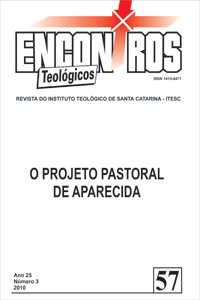A presença da Igreja Católica no Brasil e suas implicações sociopolíticas
DOI:
https://doi.org/10.46525/ret.v25i3.259Resumo
Resumo: O artigo reúne uma série de informações referentes ao agir da Igreja
Católica no Brasil, ressaltando sua incidência política na sociedade brasileira.
Toma como paradigmas dessa atuação duas figuras do episcopado, D. Sebastião
Leme e D. Helder Câmara, por considerá-los os de maior expressão nessa área e
por representarem duas visões de participação sociopolítica no século XX, ainda
presentes e em constante tensão no interior da Igreja. Depois de recordar “os
primórdios dessa ação política”, que nos quatro primeiros séculos da nossa história
foi caracterizada pelo regime de cristandade, aborda as “mudanças na sociedade,
mudanças na Igreja”, a partir do século vinte. Focaliza a Igreja “no cenário político
da década de 1960”, detendo-se no que ele qualifica de “revolução copernicana”
na atuação sociopolítica da Igreja no Brasil. Descreve as “mediações sociopolíticas
da Igreja” em nosso país, e termina aludindo à contribuição da Igreja ao empenho
por uma reforma do Estado com participação democrática.
Abstract: The article deals with a series of studies concerning the activity of the
Catholic Church in Brazil with special emphasis on the political implications in
the Brazilian society. Two outstanding leaders in the episcopate are D. Sebastião
Leme and D. Helder Câmara: both are mentioned as paradigms in this context due
to their socio political role in the XX century whose tensions are still at work inside
the Church until today. Initially, political endeavors have been dealt with during
the four centuries since the beginning of Brazil from an overall perspective of the
regime of Christianity. In the sequel of the historical background mention is made
of changes both in society and in the Church. Since then until modern times and
especially from the XX century onward the Church appears on the political scene
within the 60ties which has been interpreted in terms of a Copernican revolution.
A descriptive analysis is made of the socio political mediations of the Church in
this country. Finally, the article makes a survey of the contribution of the Church
to the reform of the State by the democratic participation of the citizen.



